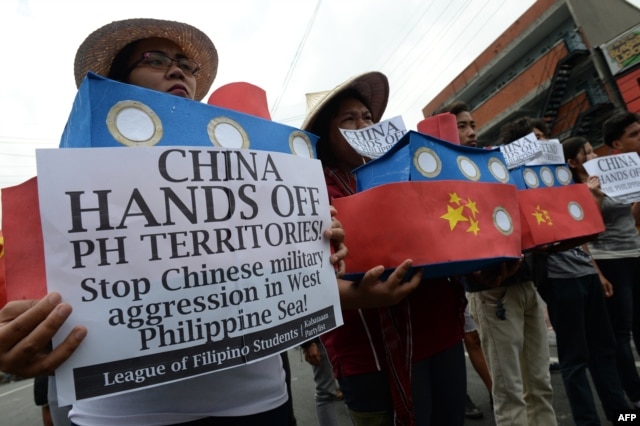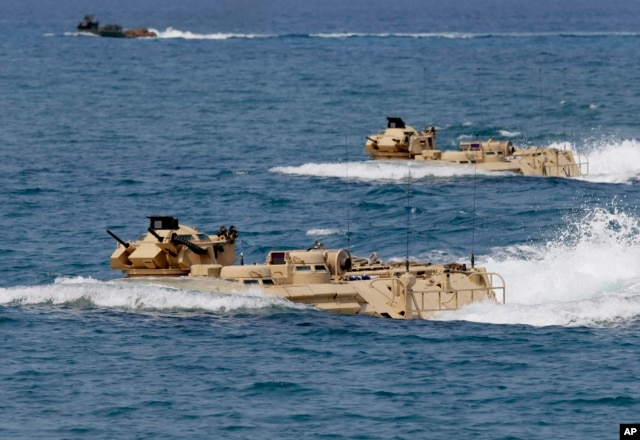When the Philippines officially declares Davao City Mayor Rodrigo Duterte president, the international community will be watching closely as his administration navigates a geopolitical landscape where tensions between China and the United States are escalating.
In the days following the May 9 election, which according to unofficial tallies resulted in a decisive win for the mayor, China expressed hope that a new administration would meet Beijing halfway to resolve its disputes with Manila in the South China Sea. “So as to put the ties of the two countries back on the track of sound development,” said China's Foreign Ministry spokesman Lu Kang.
Throughout the administration of President Benigno Aquino, Manila and Beijing had been at odds over sovereignty in the resource-rich sea.
Manila took a strong “what’s ours is ours” position, while Beijing reiterated its “indisputable sovereignty” over the sea. The two sides could not come to terms in bilateral talks, and the Aquino Foreign Ministry angered China when it took a multilateral track and filed an international arbitration case in 2013, the outcome of which is expected in the next month or so.
In recent years, China has turned disputed outcroppings -- most of which are listed in the Philippines case -- into artificial islands. The Philippines meanwhile, has strengthened military ties with the United States, which has stepped up its presence in the disputed sea.
Filipino students hold replicas of Chinese maritime surveillance ships as they shout anti-Chinese slogans during a rally near Malacanang Palace in Manila on March 3, 2016, to denounce reported Chinese vessels dropping anchor near a South China Sea atoll
Direct deal with Beijing
Throughout his campaign, Duterte, 71, expressed a willingness to deal with China directly, mentioning joint development.
At one point, Duterte said he agreed with China for not participating in the case because even if any decision is binding, it has no enforcement mechanism. He also said if bilateral talks got nowhere, he would ride a jet ski to a disputed outcropping, plant a Philippine flag there and expect to die a hero at the hands of the Chinese.
Multiple attempts to contact Duterte transition officials for this story went unanswered.
Richard Heydarian, a geopolitical analyst at Manila’s De La Salle University, said behind the tough talk, Duterte could succeed in making inroads; but, he also cautioned that the newly-elected president would have to demonstrate some distancing from the United States, the Philippines’ only mutual defense treaty ally, while engaging China.
“I think that it will be difficult because you have very strong anti-China sentiment in the Philippines. You have a very pro-American security establishment. And if China foolishly moves forward and builds facilities on the Scarborough shoal, I think all bets are off. It will be very difficult for Duterte to sell any agreement with China.”
FILE - U.S. Navy amphibious assault vehicles with Philippine and U.S. troops on board are seen during joint exercises near a beach facing one of the contested islands in the South China Sea known as the Scarborough Shoal in the West Philippine Sea.
Relationship with US
Carl Baker, director of the Pacific Forum of the Washington-based Center for Strategic and International Studies, said even if Duterte had at times shown tepid reception to the U.S. with tough talk during the campaign, the two countries' new security agreement for more U.S. troop rotations would remain intact, thanks to a Supreme Court ruling that happened before elections.
“I think from a United States perspective, they’re happy that’s how it turned out. I think from Duterte’s side it relieves a big pressure point in the relationship between the United States and the Philippines because he doesn’t have to make a commitment. He can almost let it happen as the military bureaucracy begins to implement it.”
Beyond the immediate security ties, Baker anticipates Washington will be vigilant about any possible human rights violations under the Duterte administration. He said the U.S. would take a “wait and see” stance on whether the campaign rhetoric would come to bear and if it did, he said the U.S. would likely make known its grave concern over human rights violations and extrajudicial killings.
Promise to 'kill criminals'
Duterte campaigned on a promise that like in his southern Philippine city, he would kill criminals.
Human Rights Watch and the Philippine Commission on Human Rights tracked more than 1,400 extrajudicial killings in Davao over a 17-year period through 2015. In profanity-laced speeches Duterte at times taunted human rights adherents to come after him and at other times said ridding the country of criminals would all be done within legal bounds.
While the Duterte transition team is focused on ways to boost the domestic economy and broaden its reach beyond urban centers, international watchers will be checking on how the new administration handles foreign investment.
Foreign investment
Last year, the Philippines saw the highest level of foreign direct investment at $6 billion. That figure, however, still places it well behind its Southeast Asian neighbors of similar sized economies.
Philippine Veterans Bank chairman and former finance secretary Roberto de Ocampo said he thought Duterte’s signal to make amendments to the constitution to help open the country to foreign investment “is a very good one.”
“That should have been - that’s what the business community had been pushing for even under this current administration. And probably with a new president, it may have the honeymoon effect and so forth.”
Constitutional limits on foreign ownership are among the factors that have kept the Philippines from having initial consideration into the U.S.’s new multilateral trade agreement, the Trans-Pacific Partnership.
The constitution places multiple limits on foreign ownership, including the biggest hurdle for hesitant foreign investors: 60 percent mandatory local ownership in foreign interests. Two years ago, however, the Aquino administration relaxed this rule for foreign banks.
http://www.voanews.com/content/us-china-warily-await-manila-leaders-south-sea-stance-/3328949.html



No comments:
Post a Comment
Note: Only a member of this blog may post a comment.